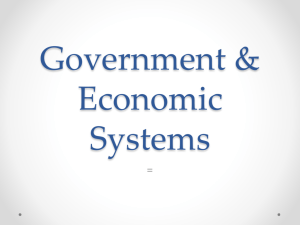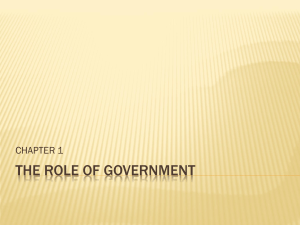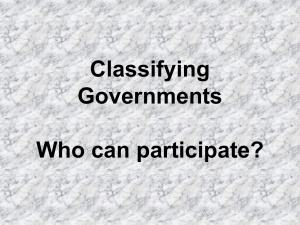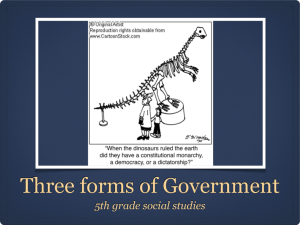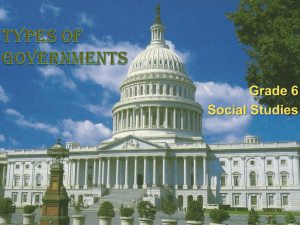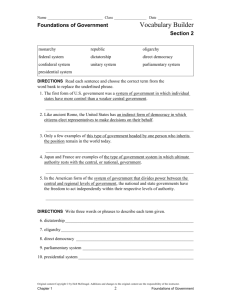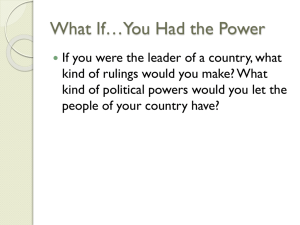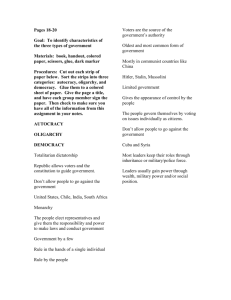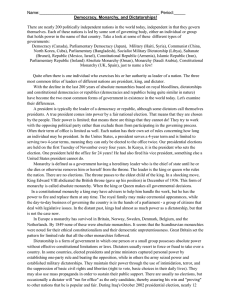Government Descriptions
advertisement
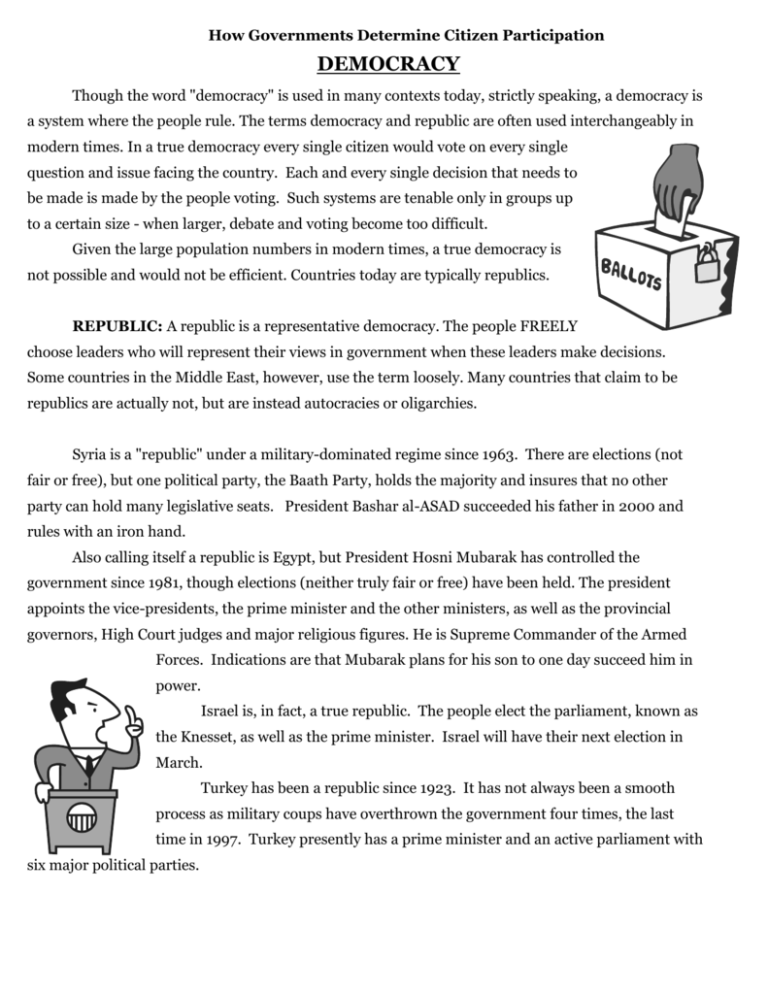
How Governments Determine Citizen Participation DEMOCRACY Though the word "democracy" is used in many contexts today, strictly speaking, a democracy is a system where the people rule. The terms democracy and republic are often used interchangeably in modern times. In a true democracy every single citizen would vote on every single question and issue facing the country. Each and every single decision that needs to be made is made by the people voting. Such systems are tenable only in groups up to a certain size - when larger, debate and voting become too difficult. Given the large population numbers in modern times, a true democracy is not possible and would not be efficient. Countries today are typically republics. REPUBLIC: A republic is a representative democracy. The people FREELY choose leaders who will represent their views in government when these leaders make decisions. Some countries in the Middle East, however, use the term loosely. Many countries that claim to be republics are actually not, but are instead autocracies or oligarchies. Syria is a "republic" under a military-dominated regime since 1963. There are elections (not fair or free), but one political party, the Baath Party, holds the majority and insures that no other party can hold many legislative seats. President Bashar al-ASAD succeeded his father in 2000 and rules with an iron hand. Also calling itself a republic is Egypt, but President Hosni Mubarak has controlled the government since 1981, though elections (neither truly fair or free) have been held. The president appoints the vice-presidents, the prime minister and the other ministers, as well as the provincial governors, High Court judges and major religious figures. He is Supreme Commander of the Armed Forces. Indications are that Mubarak plans for his son to one day succeed him in power. Israel is, in fact, a true republic. The people elect the parliament, known as the Knesset, as well as the prime minister. Israel will have their next election in March. Turkey has been a republic since 1923. It has not always been a smooth process as military coups have overthrown the government four times, the last time in 1997. Turkey presently has a prime minister and an active parliament with six major political parties. AUTOCRACY Autocracy is a method of government where a single person has power through wealth, social position, an organization or military strength. An autocracy is the same as a dictatorship or an absolute monarchy. A MONARCHY is best described in the same way that a dictatorship is. The major difference is the transfer of power. In a dictatorship, power is often not transferred at all - the death of the dictator signals the end of the dictatorship; or it is transferred to a hand-picked successor. Monarchies typically have much stricter, hereditary systems of succession, such that a monarch's first-born son is elevated to king upon the monarch's death. Monarchies can also be described as absolute or constitutional. Past and present examples include Saudi Arabia and England. ABSOLUTE MONARCHY: In an absolute monarchy the king/queen/etc. has total control. Saudi Arabia, Qatar, and Oman are absolute monarchies. In Saudi Arabia and Qatar the monarchs make all government decisions. Oman has had the same Sultan since 1970. The judicial systems of all three countries are based on sharia, or laws from the Qu’ran. CONSTITUTIONAL MONARCHY: In a constitutional monarchy the king/queen/etc. has his/her power balanced by an elected body. Different constitutional monarchies allow the monarch different amounts of power. The country of Jordan has maintained a constitutional monarchy since 1989 when the first parliamentary elections were held. The executive branch of Jordan is controlled by the monarchy. Jordan's legislative branch is a bicameral body - a Senate composed of 40 members appointed by the King, and a House of Representatives composed of 80 members elected by popular vote. Young King ABDALLAH has ruled Jordan since 1999. DICTATORSHIP: In a dictatorship one person (not a hereditary monarch) has total control and absolute power. Though there is typically a military and a bureaucracy in such a nation, and though there are typically laws to dictate everyday goings-on, the dictator has complete authority. Examples include Hitler's Germany and North Korea today. Dictatorial systems are often based on military power, and the term "military dictatorship" is used. Under Saddam Hussein, the government of Iraq was considered a dictatorship, even though it held elections of sorts. Despite political opposition within the country, Saddam Hussein was reelected to the presidency with 99% of the vote. The Revolutionary Command Council elected Saddam Hussein, not the people. The RCC was made up of the leaders of the Ba'th Socialist Party. His presidential candidacy was then put to the people in a referendum vote -"yes or no". Voters did not vote in secret and the party knew which citizens voted against Hussein. Opponents of Hussein were dealt with ruthlessly. Saddam had more than 30,000 Iraqis put to death. Sudan’s Omar al-Bashir was just named by Parade Magazine the World’s Most Evil Dictator for killing 70,000 of his own people since 1989. OLIGARCHY An oligarchy is, literally, rule by a few. Oligarchies often start as dictatorships with rule by a single person and turn into rule by a small group of people. Oligarchy is a method of government where a small group has power through wealth, social position, an organization or military strength. THEOCRACY: A theocracy is a government ruled by religious leaders according to religious law. A theocracy is an oligarchy based on religion - the group is ruled by the group's spiritual leaders. Religious leaders can often exert great influence over the group's actions. Examples include many modern Islamic states, such as Iran, or Afghanistan under the Taliban. Iran is a theocratic republic, because the citizens do get to vote, but the candidates are all required by the constitution to be religious leaders. A Guardian Council must approve all candidates for the legislature. Real power lies with Iran’s supreme leader, the Ayatollah, who reigns for life and controls the secret police and military. Iran calls its government an Islamic Republic. ARISTOCRACY: In an aristocracy, the upper class of citizens, however that might be defined in any one society, holds the power. Heredity, or rule by right of birth, plays a large role in continuing power. Aristocracy is closely related to both plutocracy and monarchy. In a typical system, such as that of medieval England, one family from a group of aristocratic families rises above the rest, either through military conquest or agreement between the families.
